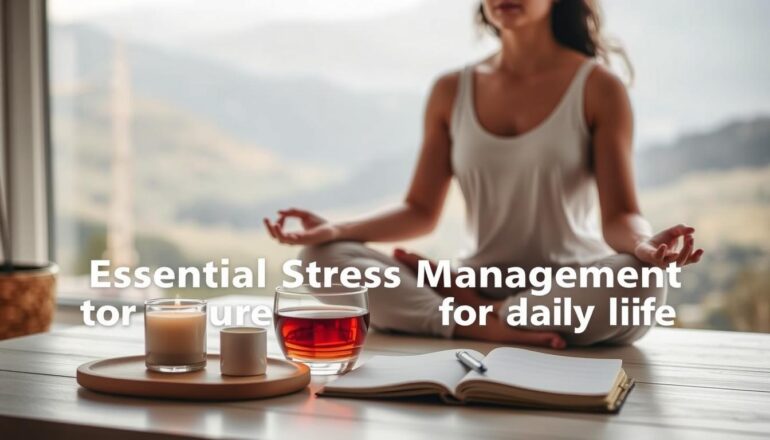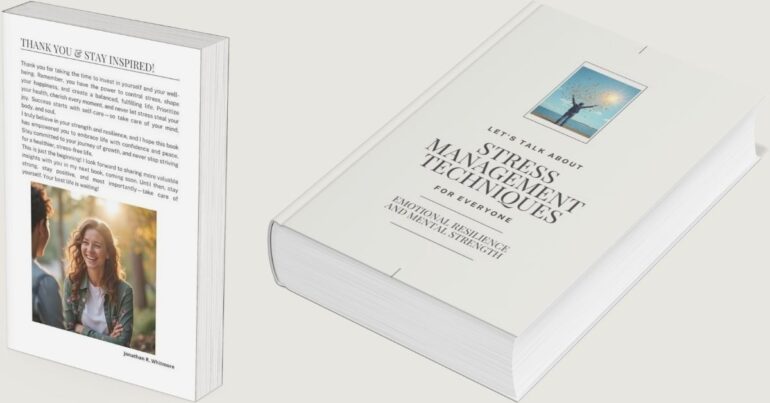I’ve been through stress myself, and I know how vital it is to manage it well. About 75% of adults face stress daily, showing how crucial stress relief is. In this article, I’ll share ways to lower stress and offer tips on managing it effectively.
Exercise can cut stress by up to 30%. Mindfulness meditation can drop stress by about 50% with regular use. Eating right and sleeping well also help, with a 25% drop in stress symptoms and 20% less stress with 7-9 hours of sleep. By adding these techniques to our day, we can boost our mental health and lessen stress.

Key Takeaways
- Approximately 75% of adults experience moderate to high levels of stress in their daily lives, highlighting the need for effective stress management techniques.
- Regular physical activity can reduce stress levels by up to 30%, making it an essential stress relief strategy.
- Mindfulness meditation can decrease stress levels by approximately 50% after consistent practice, providing a valuable tool for managing stress effectively.
- A healthy diet and quality sleep are crucial for stress management, with a 25% reduction in stress-related symptoms and 20% lower stress levels, respectively.
- Stress coping mechanisms, such as journaling and social support, can also significantly reduce stress levels and improve overall well-being.
- By incorporating these stress management techniques into our daily lives, we can improve our overall mental health and reduce stress, leading to a healthier, happier life.
- Effective time management techniques and stress management tools, such as mindfulness apps and online support groups, can also help reduce stress levels and improve stress resilience.
Understanding the Impact of Stress on Your Well-being
Exploring stress and wellness shows us how vital stress management is. Chronic stress can harm our physical, mental, and emotional health. By learning to relieve stress and manage emotions, we can live better lives.
Stress can cause headaches, muscle tension, and fatigue. It can also lead to serious health problems like high blood pressure and diabetes. To fight stress, we should exercise regularly, practice relaxation, and take care of ourselves.

Adding stress relief to our daily lives helps us handle stress better. This includes spending time with loved ones, doing hobbies, or getting professional help. Remember, our mental and emotional health is as important as our physical health.
Some key statistics to keep in mind:
- Approximately 75% of adults experience stress at some point in their lives.
- Chronic stress can lead to physical symptoms in about 60% of individuals experiencing high levels of stress.
- Up to 90% of doctor visits are related to stress-related issues.
Understanding stress’s impact and using stress management techniques can improve our lives. Whether it’s through exercise, relaxation, or self-care, there are many ways to manage stress and live a happy life.
Essential Stress Management Techniques for Daily Life
Managing stress is key in our daily lives. Whether you’re a student or a working professional, there are ways to cope. Stress relief meditation is a great technique that can be done anywhere, anytime. It helps reduce stress and anxiety, making life more balanced.
For students, managing stress is important for their mental health. Techniques like deep breathing or physical activity can help. At work, stress management is crucial for productivity and job satisfaction. By focusing on stress management, you can improve your life quality.

Other techniques include time management, social support, and positive self-talk. Adding these to your daily routine can lower stress and boost well-being. Remember, you can manage stress and anxiety. Prioritizing mental health leads to a happier, healthier life.
The Power of Mindfulness and Meditation
Mindfulness and meditation are great for managing stress and boosting well-being. They help us notice our thoughts, feelings, and body sensations better. This way, we can handle stress more easily. Stress relief activities like meditation and deep breathing can also lower stress and anxiety.
Studies show that mindfulness practice can calm the amygdala, the brain’s stress center. Mindful breathing can also calm the nervous system, lowering heart rate and blood pressure.
Getting Started with Mindfulness Practice
To start with mindfulness, try simple things like focusing on your breath or body sensations. You can also try stress relaxation methods like progressive muscle relaxation or guided visualization. The most important thing is to find what works for you and make it a daily habit.
Different Types of Meditation for Stress Relief
There are many meditation types for stress relief, like loving-kindness, transcendental, and mindfulness meditation. Try different ones to see what suits you best. Healthy ways to cope with stress include regular exercise, healthy eating, and enough sleep.
| Meditation Type | Description |
|---|---|
| Loving-Kindness Meditation | Focusing on sending kindness and compassion to oneself and others |
| Transcendental Meditation | Using a mantra to quiet the mind and access a deeper state of consciousness |
| Mindfulness Meditation | Focusing on the present moment and letting go of distractions |
Physical Exercise as a Stress-Busting Tool
Regular physical activity is a great way to reduce stress. The Department of Health and Human Services suggests at least 150 minutes of moderate aerobic activity or 75 minutes of vigorous aerobic activity per week. Even short walks can help lower stress levels.
Exercise is a powerful stress reduction strategy. It can help with mild depression and anxiety, boosting mood and self-confidence. It increases endorphins, which make us feel good, often called a “runner’s high.” To make exercise a part of your daily routine, try these tips:
- Start with short intervals of intense activity, such as 60 to 90 seconds of interval training
- Aim for at least two strength training sessions per week, targeting all major muscle groups
- Find an exercise routine that you enjoy, whether it’s walking, jogging, or yoga, to make it a sustainable part of your self-help for stress plan
Regular physical activity also improves sleep quality. Stress, depression, and anxiety often disrupt sleep. By making exercise a daily habit, you can reduce stress and improve your well-being. Exercise is a key tool in managing stress and anxiety.
By adding physical exercise to your daily routine, you can lower stress levels and boost your health. Start slowly and gradually increase the intensity and duration of your workouts. With consistent effort, you can see the benefits of stress reduction and enhance your quality of life.
Breathing Exercises and Relaxation Methods
Exploring stress relief, I see breathing exercises and relaxation methods are key. Stress relief through yoga and breathing exercises for stress really help. Adding these to my day improves my health and lowers stress.
Effective breathing exercises include deep breathing, progressive muscle relaxation, and guided visualization. These methods calm the mind and reduce stress.
To start with breathing exercises, I can try the following:
- Practice deep breathing techniques, focusing on slow, deep breaths
- Try progressive muscle relaxation, tensing and relaxing different muscle groups
- Use guided visualization, imagining a peaceful and calming environment
By adding these to my daily routine, I can lower stress and feel better. This way, I achievestress and self-carethroughmindfulness meditation for stress.
Natural Approaches to Stress Relief
Managing mental health and stress is key in our daily lives. Natural stress relief methods can be a great addition to traditional stress relief therapy. By adding natural techniques to our routines, we can lower our stress and boost our well-being.
Spending time in nature, practicing mindfulness, and using herbal remedies are some natural ways to reduce stress. A walk in the woods can fight depression. Even just seeing a forest view from a hospital room can help patients feel better. Techniques like deep breathing and progressive muscle relaxation can also help lower anxiety and promote calm.
Journaling, meditation, and yoga are other natural stress relief methods. These practices help us understand how our thoughts impact our feelings and actions. They make us more mindful and strong against stress. Combining these natural methods with traditional therapy can help create a well-rounded stress relief plan.
Exploring natural stress relief methods is a step towards a healthier, happier life. Whether it’s through nature walks, mindfulness, or herbal remedies, there are many ways to manage mental health and stress. These methods can help us feel better overall.
Managing Workplace Stress Effectively
Work is a big stress for many Americans. It can really affect our health. Chronic stress at work can cause anxiety, insomnia, and a weak immune system. To fight this, we need to focus on stress management for busy people and aim for stress-free living.
By overcoming stress and learning how to handle stress, we can work better and live better. This improves our quality of life.
Creating a healthy balance between work and life is key. We can do this by setting limits, focusing on important tasks, and taking breaks. Techniques like meditation, deep breathing, and exercise can also help. Adding these to our daily routine can lower our stress and boost our health.
Employers can help make a stress-free workspace. They can offer support and resources for stress management. This includes employee assistance programs and promoting a healthy work-life balance. Together, we can make a better work environment for everyone.
Here are some ways to manage workplace stress:
- Set clear boundaries and priorities
- Take regular breaks and practice self-care
- Do physical activity and stress-reducing exercises
- Seek help from colleagues, managers, or employee assistance programs
Lifestyle Changes for Long-term Stress Management
Making lifestyle changes is key for managing stress over time. By adding stress-reducing habits to our daily routine, we can lower our stress levels. This includes joining stress management programs that encourage healthy habits like regular exercise and balanced eating.
Stress relief exercises like yoga or walking are very effective. They help reduce anxiety and boost our mood. Also, learning relaxation techniques, such as deep breathing or meditation, can be very helpful.
Sleep Optimization
Sleep is vital for managing stress. Adults need 7 or more hours of sleep each night for good health. Having a regular sleep schedule and a calming bedtime routine can enhance sleep quality.
Nutrition for Stress Relief
Eating a healthy diet is important for stress relief. Foods rich in complex carbs, lean proteins, and healthy fats can lower blood pressure and improve mood. Antioxidant-rich foods like fruits and veggies also protect cells from stress damage.
Building Healthy Routines
Creating healthy routines, like regular exercise and social activities, can reduce stress. Doing things that bring joy and relaxation, like reading or spending time with family, can also help. By adding these stress-reducing habits to our daily lives, we can enhance our well-being and lower stress levels.
- Engage in regular physical activity, such as walking or yoga, to reduce anxiety and improve mood.
- Practice relaxation techniques, such as deep breathing or meditation, to calm stress.
- Establish a consistent sleep schedule and create a relaxing bedtime routine to improve sleep quality.
- Eat a healthy diet rich in complex carbohydrates, lean proteins, and fatty acids to lower blood pressure and improve mood.
Building a Support System for Stress Relief
As a professional or entrepreneur, having a support system is key for stress relief for professionals and stress management for entrepreneurs. Friends, family, or colleagues can offer emotional support. They help you stay calm under pressure. It’s important to have people who can guide and encourage you when dealing with stressful situations.
To build a support system, nurture relationships with loved ones. Join social groups or clubs, and take part in community activities. This makes you feel connected and less isolated. It’s vital for stress relief for professionals and stress management for entrepreneurs. Surrounding yourself with positive people helps you stay calm under pressure and manage stress.
Here are some ways to build a support system:
- Join a professional network or organization
- Volunteer for a cause you’re passionate about
- Take part in group fitness classes or sports
- Go to social events and gatherings
Building a support system can lower your stress levels and improve your well-being. Remember, stress management for entrepreneurs and stress relief for professionals is key for a healthy work-life balance. With a strong support system, you can handle stressful situations better and stay calm under pressure.
Are you tired of feeling overwhelmed by daily pressures? Do you want to regain control over your life and achieve inner peace? Our e-book on Stress Management Techniques is your key to reducing stress, improving mental clarity, and living a healthier, happier life!

Inside, you’ll find powerful stress relief strategies, including relaxation techniques, mindfulness exercises, and healthy lifestyle habits to help you overcome anxiety and build resilience. Whether you’re dealing with work stress, personal challenges, or emotional burnout, this guide provides effective stress management solutions tailored to your needs.
Creating Your Personalized Stress Management Plan
Life can be tough, and we all need a plan to handle stress. This plan should include stress relief for parents, stress relaxation therapy, and other stress management tools that fit us. By knowing what stresses us, picking the best methods, and keeping track, we can lower our stress and feel better.
Techniques like mindfulness, meditation, and deep breathing are great for stress. They help us relax and feel more balanced. Also, regular exercise, like walking or yoga, can make us feel happier and less stressed.
- Find out what stresses you, like work or family
- Pick the best methods for you, like meditation or deep breathing
- Keep track of how you’re doing, with a journal or app
By taking these steps and adding stress relief for parents and stress relaxation therapy to our day, we can make a plan that’s just right for us. This plan will help us live a more balanced and healthy life.
Conclusion: Your Journey to a Stress-Free Life
As we reach the end of this guide, I hope you feel ready to tackle stress. You can start a journey towards a healthier, happier life. By using the stress elimination techniques, stress resilience training, and personal stress management strategies, you can achieve a stress-free mindset.
Stress is a natural part of life, but you can manage it. Use mindfulness, exercise, and relaxation to find your way to stress relief. By focusing on your well-being and making small changes, you can change your life for the better.
The journey will have its ups and downs, but you can overcome them. Be determined and kind to yourself. Try the strategies we talked about, track your progress, and celebrate your wins. Your hard work will lead you to a stress-free life, where you can enjoy everything life has to offer.
FAQ
What are the physical effects of chronic stress?
Chronic stress can cause many physical issues. It can make your heart rate go up and your blood pressure rise. It also leads to muscle tension, headaches, and a weakened immune system.
How can mindfulness and meditation help reduce stress?
Mindfulness and meditation calm your mind and reduce negative thoughts. They help you relax, leading to lower stress levels and better well-being.
What are some natural approaches to stress relief?
Natural ways to reduce stress include taking supplements and using herbal remedies. Aromatherapy and relaxation techniques like yoga and deep breathing are also helpful.
How can I manage workplace stress effectively?
To manage workplace stress, set clear boundaries and practice good time management. Creating a stress-free workspace is also key.
What lifestyle changes can help with long-term stress management?
For long-term stress management, focus on getting enough sleep and eating well. Building healthy daily routines is also important.
How can I create a personalized stress management plan?
To make a stress management plan, first identify what stresses you. Then, choose the best techniques for you. Keep track of how well they work over time.

